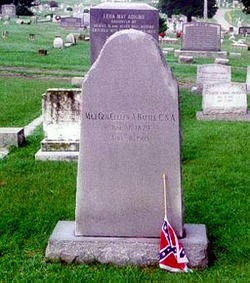Only known wartime photograph of Battle taken after August of 1863
Cullen Andrews Battle was born in Powelton, Georgia in 1829. The son of a doctor, he moved with his family to Eufaula, Alabama at the age of seven. He graduated from the University of Alabama and studied law under John Gill Shorter. Shorter would become the governor of Alabama during the Civil War. Battle would become a lawyer and because of his eloquent speech would enter politics. He was a close friend of William Lowndes Yancey and became a strong secessionist.
When the war began, Battle became major of the 3rd Alabama Infantry. the regiment was sent to Virginia. Before seeing any action, he was promoted to lieutenant colonel of the unit. The regiment's colonel Tennent Lomax was killed at Seven Pines. Battle was slightly wounded in the same engagement, but was promoted to colonel. He led the 3rd Alabama at South Mountain and Sharpsburg. He was slightly wounded at both places, entering a hospital for only one day following Sharpsburg. His old law mentor, Governor Shorter had been campaigning hard behind the scenes for Battle's promotion. Shorter stated that Battle's gallantry was notorious within the army.
He would see only limited action during the Chancellorsville Campaign. In April of 1863, his horse reared and fell with him into a ditch injuring him severely. Two days later, while jumping another ditch, his back was wrenched badly on horseback. He was riding in an ambulance during the Chancellorsville Campaign. He performed well at Gettysburg, despite the fact that he was part of Edward O'Neal's disjointed assault. O'Neal was passed over for brigadier general and Battle was promoted on August 20, 1863. He would be absent November and December of that year with chronic bronchitis.
During the Overland Campaign, he led his brigade capably, but his best service would come in the Shenandoah Campaign of 1864 under Lieutenant General Jubal Early. He fought hard at Winchester and again at Cedar Creek. At the later battle, he was shot in the left knee, causing serious injury to the kneecap. Although the leg would be saved, he would get around on crutches for years. He would not recover in time to return to the war.
Following the war, he would again practice law, then move to North Carolina and edit a newspaper. He also became mayor of New Bern, North Carolina. He would die in Greensboro, North Carolina in 1905 of sepsis. He was 75 years old. He rests today in Virginia's second largest cemetery, Blandford Cemetery, Petersburg, Virginia. Battle was called a man of duty. His memoirs were published called Third Alabama: The Civil War Memoirs of Brigadier General Cullen Andrews Battle, CSA.

Grave of Cullen Andrews Battle

I kept thinking about this man and his numerous injuries. Duty isn't a word we hear that often anymore. I am concluding that it must have surely been something more than self-preservation that drove these heroes to return to the battlefield repeatedly. Duty. Now there is a concept for these modern days.
ReplyDelete